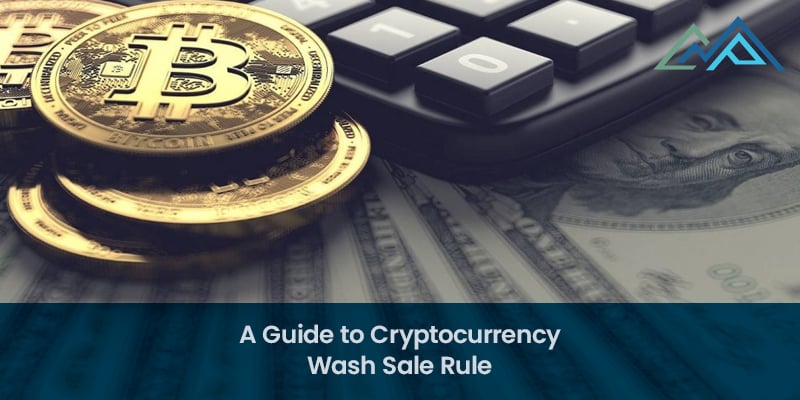As crypto trading and use become increasingly mainstream, there's been talk about how and if the US government will try to regulate crypto and other digital assets. Lawmakers have considered extending the wash-sale rule to digital assets, but no change has been enacted yet.

At CMP, we've been hearing a lot about crypto taxes and getting questions about how to account for crypto properly. Experienced crypto investors should know about the wash-sale rule. In this post, we'll explain whether that rule applies to crypto transactions and whether that's likely to change.
What is Tax-Loss Harvesting?
Before we explain the wash-sale rule, we need to explain the concept of tax-loss harvesting. Tax-loss harvesting happens when taxpayers sell an investment at a loss to offset the gains they made on other assets.
The concept of tax-loss harvesting is often used by people who have capital gains to report because it reduces or offsets the amount of capital gains they have. This technique may also be used by taxpayers who do not have capital gains.
Taxpayers can deduct up to $3,000 of net capital losses against ordinary income each year if filing as single or married filing jointly. Taxpayers filing separately may deduct up to $1,500 each..
It’s most common to use tax-loss harvesting to offset short-term capital gains because these are taxed at a higher rate than long-term gains. However, it can be used in either case.
Deciding when and how to sell an asset at a loss can be strategic. You should know that the sale must occur during the relevant tax year if you want to harvest losses. To claim a loss on a given year’s taxes, the sale must occur on or before December 31 of that year.
If you have more than $3,000 in losses in a tax year, the IRS allows you to carry the loss into subsequent years. The $3,000 limit applies for each tax year, so if you sustained $9,000 in losses, you would need to spread the tax-loss harvesting over three tax years to claim all of it.
What is a Wash-Sale?
One of the methods that people used to take advantage of deductions for losses was something called a wash-sale. The SEC defines a wash-sale as any sale where you "sell or trade securities at a loss" and then do one of three things within 30 days of that sale.
- Buy securities that are substantially identical to the ones you sold.
- Acquire securities that are substantially identical to those sold in a fully taxable trade.
- Acquire an option or contract to purchase substantially identical securities.
For the purposes of determining whether a transaction is a wash-sale, the IRS requires that the replacement be an identical or substantially identical security.
In theory, a wash-sale could have been used to get out of paying taxes by claiming a deduction. Prior to the IRS regulation that prohibits such sales, a wash-sale was a tax loophole.
We should note that the wash-sale rule also applies to trades of stocks, bonds, or securities in taxable accounts. Retirement accounts such as IRAs are not exempt.
What is the IRS Tax Treatment of Wash-Sales?
The IRS prohibits wash-sale deductions to offset capital gains, but let's talk about what that means. For the purposes of determining whether a transaction is a wash-sale, it must involve identical stock. That means if you sold stock in a company for $1,500 at a $500 loss and repurchased the same stock for $1,600 within 30 days, you could not claim a deduction for the $500 loss. That's the wash-sale rule.
The term "substantially identical" may be applicable when a company reorganizes. While the stock isn't identical to the old company's stock, it may be close enough to trigger the wash-sale rule.
A similar issue may arise with preferred stock and common stock from the same company. While they are not identical, the wash-sale rule may apply if the preferred stock can be converted into common stock.
There is an exception for losses incurred in the ordinary course of business by a dealer in securities. The IRS says that the wash-sale rule applies "unless the loss was incurred in the ordinary course of your business as a dealer in stock or securities."
Why Does the Wash-Sale Rule Exist?
The wash-sale rule exists to prevent people from taking advantage of tax deductions by repeatedly selling and rebuying stock. While, in theory, that might make sense, the truth is more complicated than you might imagine.
One common criticism of the wash-sale rule is that it is one-sided, meaning that it applies only to losses and not to gains. In other words, if you sold stock at a loss and then rebought it, the IRS won't allow you to get any tax benefits on your loss.
However, if the reverse happens, and you sell stock and receive a higher price than you paid for it and then decide to repurchase an identical security, the IRS still expects to collect the full amount of capital gains tax you owe from the first transaction. Your entire capital gain is considered taxable income even if you turn around and put all of it into a new stock purchase.
Does the Wash-Sale Rule Apply to Cryptocurrency?
One of the questions that we've been hearing from our clients is about whether the wash-sale rule applies to cryptocurrency.
The short answer is that under current tax law in 2025, the wash-sale rule does not apply to most cryptocurrency because it is treated as property rather than a security. If you sustained capital losses from selling a digital currency and repurchased it within 30 days, you could still take advantage of a deduction to reduce your tax bill.
The reason that the wash-sale rule doesn't apply to cryptocurrency is that the IRS classifies cryptocurrency as property, not as a security. That means that you can take advantage of deductions when filing your crypto taxes.
There are exceptions. While the wash-sale rule does not apply to most digital currencies, it can apply to crypto instruments that are treated as securities, including synthetic versions of stocks or tokenized securities. The IRS and SEC may also consider initial coin offerings (ICOs) to be securities, so the wash-sale rule would apply if such a ruling applies.
How Can I Avoid Violating the Wash-Sale Rule?
For securities, there are a few ways to avoid triggering the wash-sale rule. These rules do not currently apply to most cryptocurrency.
- Hold off on the repurchase of an identical security. The wash-loss rule specifies that sales of substantially identical securities will invalidate tax-loss harvesting if they take place within 30 days of the loss. The simplest way to avoid violating the wash-sale rule is to wait 31 days or more to repurchase any stocks or securities that would trigger the rule.
- Buy similar but not identical securities. There’s a lot of wiggle room in terms of what you can buy to claim a loss that reduces your tax liability. Instead of buying a substantially identical security, you could sell a stock in a particular industry or sector and then purchase a different stock in the same industry or sector without violating the wash-sale rule. Keep in mind that you'll be less likely to attract the attention of the IRS if you purchase something with a substantial difference.
- Invest in an ETF. Let's say that you sold a tech stock and sustained a loss. Another strategy to avoid the wash-sale rule would be to invest in a tech ETF instead of buying stock from a single company.
- Buy substantially different stock. The final option is to invest your money from the sale that triggered the capital loss into a stock from a different industry or sector. The IRS will not be concerned if you sell manufacturing stock at a loss and purchase tech stock with the money. While the rules around "substantial" similarities can be complex, this option leaves no room for confusion.
You may also want to consider working with a qualified tax professional to help you reduce your taxable capital gains.
Let Us Help You Minimize Your Crypto Tax Bill
The wash-sale rule is a complex feature of the tax code, and while it doesn't currently apply to many cryptocurrency transactions, it could change. Keep in mind that even if the law does change, there are tactics you can use to minimize your tax liability and harvest losses on your taxes.
Do you need help from a cryptocurrency tax professional?

















